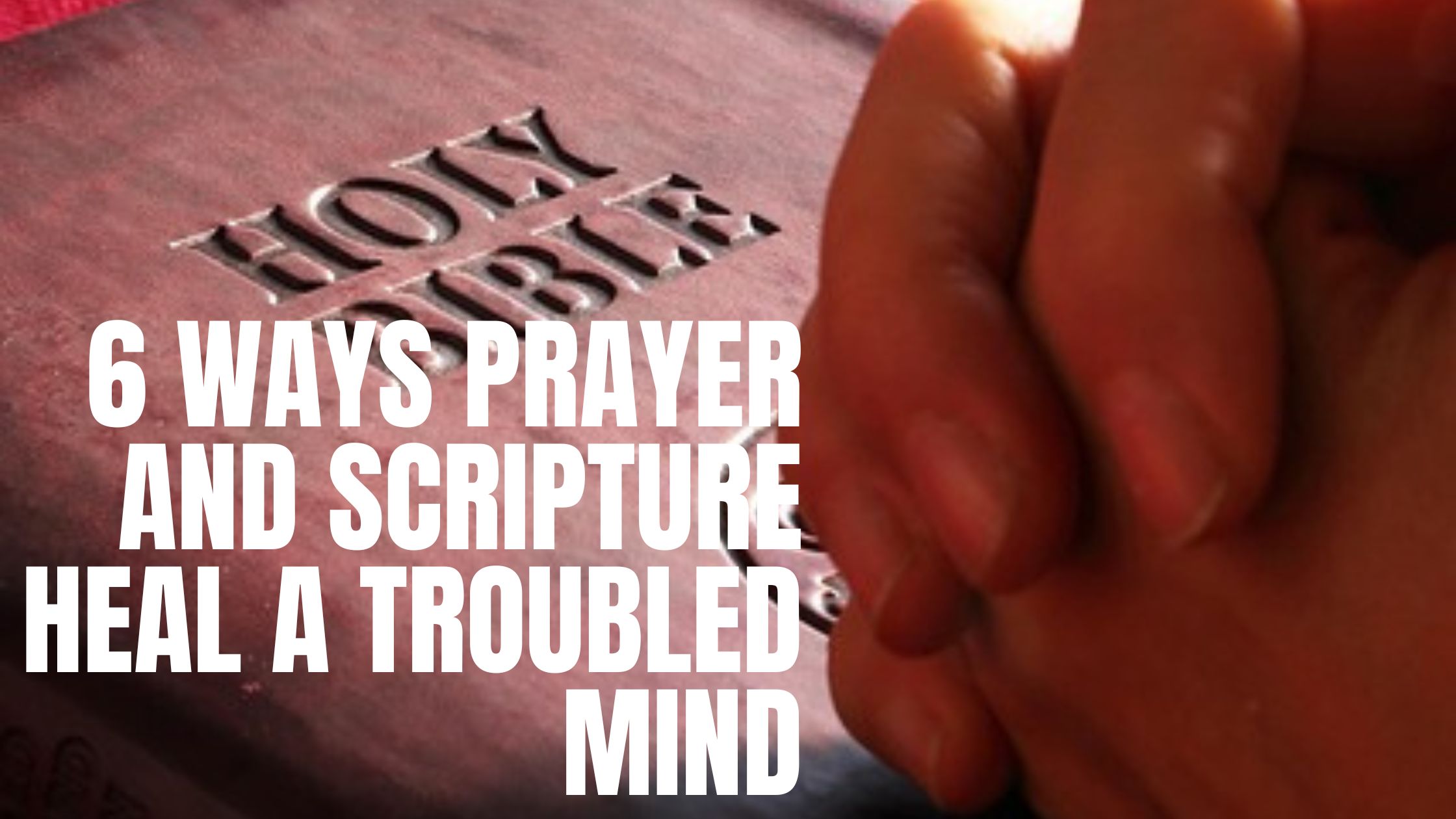🌿 Introduction
6 Ways Prayer and Scripture Heal a Troubled Mind
In today’s fast-paced and stressful world, mental struggles like anxiety, worry, and depression often weigh heavily on people’s hearts. While therapy and self-care practices are valuable, many find lasting peace in the timeless wisdom of the Bible. Prayer and Scripture offer a spiritual anchor, helping believers calm their troubled minds and restore inner peace. This article explores six powerful ways prayer and God’s Word bring healing to emotional struggles, along with practical tips, benefits, and biblical insights.
🙏 6 Ways Prayer and Scripture Heal a Troubled Mind

1. Prayer Brings Peace Beyond Understanding
Philippians 4:6-7 reminds us not to be anxious but to present our requests to God in prayer. When we pray, we release our burdens and allow God’s peace to replace fear and worry.
Tip: Start your morning with 10 minutes of prayer, asking God to guide your thoughts.
2. Scripture Renews the Mind
Romans 12:2 teaches us to be “transformed by the renewing of your mind.” Reading the Bible daily helps shift negative thinking patterns into godly, hope-filled thoughts.
Tip: Memorize uplifting verses like Psalm 34:17-18 to recall in moments of stress.
3. Prayer Strengthens Faith During Trials
A troubled mind often feels weak. Through prayer, we connect with God’s strength. James 1:5 encourages us to ask God for wisdom when facing confusion or doubt.
Tip: Keep a prayer journal to write down your struggles and God’s answers over time.
4. Scripture Reminds You of God’s Promises
Fear often arises when we forget God’s faithfulness. Verses like Isaiah 41:10 (“Do not fear, for I am with you…”) reassure us that we are never alone.
Tip: Create sticky notes with promises from Scripture and place them where you’ll see them daily.
5. Prayer Restores Gratitude and Hope
Thankful prayer helps shift focus from problems to blessings. 1 Thessalonians 5:16-18 calls us to “rejoice always, pray continually, give thanks in all circumstances.”
Tip: End each night by thanking God for three things before bed.
6. Scripture Offers Eternal Perspective
When overwhelmed, the Bible reminds us that our present troubles are temporary compared to eternal joy (2 Corinthians 4:17). This gives hope in seasons of despair.
Tip: Read Psalms daily, especially Psalms of comfort like Psalm 23 and Psalm 91.
🌟 Benefits of Prayer and Scripture for a Troubled Mind

- Deep Inner Peace – Prayer calms racing thoughts and replaces anxiety with God’s peace (Philippians 4:7).
- Renewed Perspective – Scripture reminds us of God’s promises, helping us see problems in light of His eternal plan.
- Strength in Weakness – Prayer connects us with God’s power, giving courage to face daily struggles.
- Reduced Stress and Anxiety – Meditating on verses helps shift focus away from fear and worry.
- Cultivates Gratitude – Thankful prayer encourages a positive mindset, reducing negative thought patterns.
- Restores Hope – God’s Word offers encouragement during despair, reminding us that better days are ahead.
- Spiritual Growth – Consistent prayer and Scripture study build a stronger faith and deeper relationship with God.
- Improved Emotional Health – Both practices help manage emotions, leading to more joy, patience, and contentment.
📈 Trending Now: Spiritual Healing & Mental Health (2025)
Here’s what’s shaping the landscape of spiritual and mental wellness this year:
1. Spiritual & Wellness Summits Gain Momentum
Madhya Pradesh hosted the 2025 Spiritual and Wellness Summit in Ujjain, where leaders emphasized integrating spirituality with economic growth and health tourism. Ujjain is being positioned as a global wellness destination, combining tradition, technology, and sustainable development.The Times of India
2. Yoga’s Mental Health Impact Goes Mainstream
On International Yoga Day 2025, experts highlighted how regular yoga benefits mental well-being—including anxiety management, emotional balance, and stress reduction. Studies link practice to structural brain improvements and enhanced mood-regulating chemicals like serotonin and dopamine.Indiatimes
3. Mindful & Healing Jewelry Becomes Popular
Mindfulness and crystal-healing jewelry have soared in popularity, offering emotional and spiritual comfort through design and chakra-based energy alignment. Despite limited scientific backing, this reflects a deeper cultural shift toward holistic well-being.Financial Times
4. Digital Spirituality Flourishes Online
Platforms like TikTok are fueling a boom in “online spirituality”—think oracle card readings, astrology, and aura aesthetics. While many find comfort in these expressive forms, critics caution that such trends may lean more toward commodification than genuine healing.Marie Claire UK
5. Holistic Energy & Digital Healing Expand
Spiritual healing is going digital—with practices like virtual Reiki, sound healing sessions, meditation coaching, and AI-driven energy medicine on the rise. An emerging blend of ancient traditions and modern tech is making holistic healing more accessible.TenciaEnergyHealingiphm.co.uk
6. AI-Enhanced Mental Health Tools on the Rise
Artificial intelligence is transforming mental health care—through mood-tracking apps, AI therapists, and predictive analytics for early intervention. New innovations, such as AI-augmented journaling tools, are also showing promising results in improving mental health outcomes.arXivWikipedia
7. Narrative & Community-Based Healing
Storytelling and community have become essential elements of healing. There’s growing interest in emotional narratives—via memoirs, narrative podcasts, and group healing spaces. Movement toward community-centered mental wellness continues to strengthen.blog.nextatlas.comPress Strove
Summary Table: 2025 Trends in Spiritual Healing & Mental Health
| Trend Area | Highlight |
| Wellness Summits | Ujjain’s summit blends spirituality, wellness, and economy |
| Yoga & Mental Health | Yoga linked to improved emotional resilience and brain health |
| Mindful Jewelry | Crystal and chakra-based jewelry as emotional support tools |
| Online Spirituality | Rise of astrology, tarot, and spiritual aesthetics online |
| Digital Energy Healing | Virtual Reiki, sound healing, and AI-enhanced holistic therapies |
| AI Mental Health Tools | AI chatbots, journaling, and predictive mental health support |
| Storytelling & Community Healing | Emotional narratives, podcasts, and collective healing spaces |
💡 Suggestions for Best Results

- Start Small, Stay Consistent – Begin with short prayers and a few verses daily. Consistency is more powerful than long, irregular sessions.
- Create a Peaceful Space – Dedicate a quiet corner in your home for prayer and Bible reading to help you focus.
- Pray Honestly – Don’t worry about fancy words; talk to God openly about your struggles and emotions.
- Pair Scripture with Prayer – Read a verse, then turn it into a prayer for your situation. This strengthens understanding and faith.
- Use Journaling – Keep a prayer and Scripture journal to track answered prayers and lessons learned.
- Incorporate Worship Music – Listening to soft Christian music or hymns while reading Scripture can deepen peace.
- Seek Community Support – Join a Bible study or prayer group to gain encouragement and accountability.
- Balance Spiritual & Practical Care – Combine prayer and Scripture with healthy habits like exercise, rest, and proper nutrition for overall well-being.
- Memorize Key Verses – Keep encouraging scriptures in your heart so they come to mind during anxious moments.
- Trust the Process – Healing and peace may not come instantly; stay faithful and patient as God works in your life.
📝 Conclusion
Prayer and Scripture are powerful tools for calming a troubled mind. They offer peace, hope, and strength that the world cannot provide. By turning to God’s Word and opening your heart in prayer, you invite His presence to transform your thoughts and emotions. Start small, stay consistent, and watch how God restores your peace of mind.
📖 References
- The Holy Bible, NIV Translation.
- Philippians 4:6-7 – Peace through prayer.
- Romans 12:2 – Renewing the mind.
- Isaiah 41:10 – God’s presence in fear.
- 2 Corinthians 4:17 – Eternal perspective.
❓ FAQs
Q1. Can prayer really help with depression and anxiety?
Yes, prayer provides comfort and reduces stress by shifting focus to God’s presence and promises.
Q2. How often should I read the Bible for peace of mind?
Daily reading, even 10–15 minutes, can significantly improve mental and spiritual health.
Q3. Which Bible book is best for a troubled mind?
The Psalms are particularly comforting, as they express both human struggles and God’s deliverance.
Q4. Can I combine prayer with professional therapy?
Absolutely. Many Christians benefit from both prayer and professional counseling.
Q5. What’s the first step if I feel too anxious to pray?
Start with short prayers like “Lord, give me peace today” and gradually build your prayer habit.

